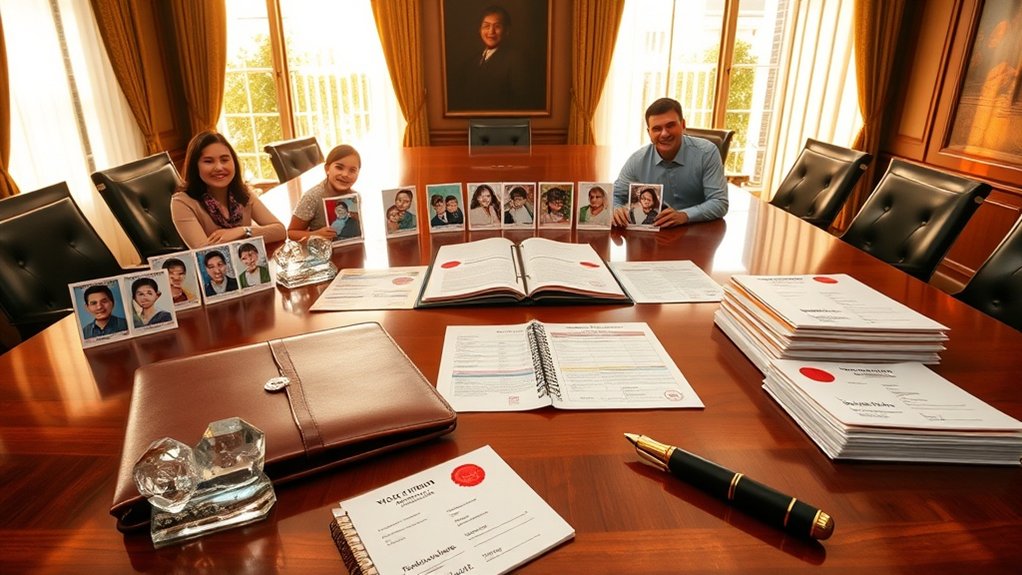You’ve secured your digital nomad visa for Portugal, but now you’re facing the complex challenge of bringing your spouse and children along. The dependent visa process isn’t simply an extension of your application—it requires distinct documentation, financial thresholds, and timing strategies that can make or break your family’s relocation plans. Vieira Braga Advogados has developed a systematic approach that addresses the unique complications families encounter when navigating Portugal’s dependent visa requirements.
Understanding Portugal’s Dependent Visa Framework for Digital Nomad Families

As Portugal’s digital nomad visa gains popularity among remote workers, many applicants discover they need to navigate the dependent visa framework to bring their families along. Portugal’s dependent visa system allows digital nomad visa holders to include their spouses and unmarried children under 18 in their applications.
You’ll need to understand that dependent visas are tied directly to your primary digital nomad visa status. When you apply for Portugal’s digital nomad visa, you can simultaneously submit dependent applications for eligible family members. Your spouse must provide marriage certificates, while children require birth certificates proving the relationship.
The dependent visa grants your family members the same residency rights and duration as your primary visa. They can live in Portugal throughout your digital nomad visa period and access essential services like healthcare and education. However, dependent visa holders cannot work in Portugal unless they obtain separate work authorization.
Families holding dependent visas also gain access to the Schengen Area, enabling free travel across 26 European countries during their residency period.
Documentation Requirements and Evidence Standards for Spouse Applications
When applying for a dependent visa as the spouse of a digital nomad in Portugal, you’ll need to navigate specific documentation requirements that prove both your marital relationship and financial stability. Your marriage certificate must undergo an authentication process that includes apostillation or consular legalization, depending on where you were married. Additionally, you’ll need to provide comprehensive financial evidence demonstrating that your digital nomad spouse can support you throughout your stay in Portugal. Given the complexity and frequent updates of immigration laws, securing specialized legal guidance can help ensure your application meets all current requirements and avoid potential delays or rejections.
Marriage Certificate Authentication Process
Before you can submit your spouse’s dependent visa application, you’ll need to authenticate your marriage certificate through a multi-step verification process that varies significantly between countries. You’ll typically start by obtaining an apostille from your home country’s designated authority if it’s a Hague Convention member. For non-Hague countries, you’ll require consular legalization through the Portuguese embassy or consulate.
The document must then undergo sworn translation by a certified Portuguese translator. You can’t use machine translations or unofficial translators. Some jurisdictions require additional steps like notarization before apostille or legalization.
Processing times range from days to months depending on your country’s bureaucratic efficiency. Plan accordingly and start this process early, as delays here will postpone your entire dependent visa application timeline. Simple mistakes during the authentication process can result in application denials or unnecessary delays, which is why many couples seek specialized legal guidance to ensure proper documentation compliance.
Financial Support Evidence Requirements
Financial documentation represents the backbone of your spouse’s dependent visa application, requiring comprehensive proof that you can support both yourself and your partner without relying on Portuguese social services. You’ll need to provide bank statements covering the last three to six months, showing consistent income streams and adequate savings balances. Employment contracts, freelance agreements, or business registration documents demonstrate your professional stability as a digital nomad. Tax returns from your home country validate your declared income levels. Investment portfolios, property ownership certificates, or pension statements can supplement your financial profile. Portuguese authorities typically require proof of monthly income exceeding €760 per dependent, though higher amounts strengthen your application significantly and reduce processing delays. Professional legal support can expedite the process by ensuring all financial documentation meets Portuguese immigration requirements and minimizing common errors that lead to application delays.
Child Dependent Visa Protocols and Age-Specific Considerations

When you’re applying for child dependent visas as a digital nomad, you’ll encounter strict age limits that vary significantly between countries—typically ranging from 18 to 25 years old. You must provide comprehensive educational documentation that proves your child’s enrollment status, academic progress, and financial dependency on you as the primary visa holder. These requirements become more complex as your children approach the upper age limits, often requiring additional proof of full-time student status or unmarried status to maintain eligibility. Immigration lawyers can provide legal guidance to navigate these complex documentation requirements and minimize the risk of application delays or rejections due to incomplete paperwork.
Age Limits and Requirements
Although digital nomad visa programs welcome families, they impose strict age restrictions on child dependents that vary significantly between countries. You’ll need to verify these requirements before applying, as exceeding age limits disqualifies your children from dependent status.
Most jurisdictions set the cutoff between 18-25 years, with additional stipulations for older dependents. Here’s how major destinations compare:
| Country | Age Limit | Additional Requirements |
|---|---|---|
| Portugal | 25 years | Must be financially dependent |
| Estonia | 19 years | Full-time student status required |
| Dubai | 21 years | Unmarried and financially dependent |
You’ll also encounter proof-of-dependency requirements, including financial support documentation, educational enrollment certificates, and unmarried status declarations. Some countries require annual renewals with updated dependency verification, while others maintain validity throughout the primary visa period. Given the complexity of immigration laws and frequent policy changes, seeking specialized legal support can help prevent application delays or denials due to errors in the documentation process.
Educational Documentation Standards
Beyond proving financial dependency, you’ll need to submit comprehensive educational documentation that demonstrates your child’s academic status and enrollment history. Portuguese immigration authorities require current school enrollment certificates, transcripts covering the last two academic years, and official grade reports translated by certified translators. You must also provide proof of your child’s intended educational arrangements in Portugal, whether through international schools, Portuguese institutions, or homeschooling programs.
Documentation standards vary by age group. Children under 6 need basic enrollment verification, while those aged 6-18 require detailed academic records and curriculum compatibility assessments. University-age dependents must submit degree transcripts, enrollment verification, and course completion certificates. All documents need apostille certification from your home country. Similar to immigration processes in other countries, criminal background checks from your home country and recent residences are essential documentation requirements that must be properly authenticated. Vieira Braga Advogados ensures your educational paperwork meets Portugal’s strict authenticity requirements, preventing visa delays or rejections.
Financial Proof Strategies for Supporting Multiple Family Members
Since supporting multiple family members requires substantially higher financial thresholds, you’ll need to develop a comprehensive strategy that demonstrates consistent income streams and adequate savings. You should consolidate multiple revenue sources into clear documentation showing monthly earnings from clients, contracts, and passive income streams. Create detailed spreadsheets tracking income patterns over 12-24 months, highlighting stability and growth trends.
You’ll want to maintain separate accounts for business expenses and personal funds, making it easier to demonstrate available money for family support. Consider obtaining bank letters confirming average balances and establishing credit lines as backup financial security. Document your spouse’s potential earnings if they’ll work remotely, as dual income strengthens applications significantly.
You should also prepare cost-of-living calculations for your destination country, showing how your income covers housing, healthcare, education, and daily expenses for each family member. Include emergency fund documentation representing 6-12 months of family expenses. Early action with specialized legal assistance helps avoid costly mistakes and reduces the risk of delays that could outweigh initial legal fees.
Healthcare Access Integration for Dependent Visa Holders

Healthcare coverage represents one of the most complex aspects of securing dependent visas for digital nomad families, as many countries require proof of comprehensive medical insurance before approving applications.
You’ll need to demonstrate that your spouse and children have adequate medical coverage that meets the host country’s minimum requirements. Most nations mandate coverage amounts between €30,000-€100,000 annually, with specific provisions for emergency treatment, hospitalization, and repatriation.
| Coverage Type | Minimum Requirement | Documentation Needed |
|---|---|---|
| Emergency Medical | €30,000-€50,000 | Insurance certificate with coverage details |
| Hospitalization | €50,000-€100,000 | Policy terms showing inpatient benefits |
| Repatriation | €10,000-€25,000 | Proof of medical evacuation coverage |
Private international health insurance typically provides the most comprehensive solution, though some countries accept travel insurance for shorter-term dependent visas. You’ll want to secure policies that explicitly cover all family members and remain valid throughout your intended stay duration.
Errors in insurance documentation or insufficient coverage amounts can lead to visa denials, making specialized legal assistance essential for ensuring all requirements are properly met before submission.
How will your children continue their education while living abroad on dependent visas? You’ll need to navigate multiple educational pathways depending on your destination country and children’s ages.
International schools offer English-language curricula that align with global standards, making transitions smoother when you relocate. These institutions typically accept students year-round and understand the unique needs of expatriate families. However, they’re often expensive and may have waiting lists.
Local public schools provide cultural immersion and language acquisition opportunities. Your dependent visa status usually grants access to public education, though enrollment procedures vary by country. You’ll need to research curriculum requirements, academic calendars, and language support services.
Online schooling maintains continuity with your home country’s educational system. This option works well for frequent relocators but requires strong parental involvement and reliable internet connectivity.
For families choosing Brazil as their destination, Study Visas allow children to attend educational institutions while parents may be permitted to work part-time during their studies.
Vieira Braga Advogados helps identify education-friendly visa destinations and connects families with educational consultants who specialize in international student transitions.
Timeline Management and Application Coordination Across Family Members

When applying for dependent visas as a digital nomad family, you’ll face the complex challenge of synchronizing multiple applications while managing different processing timelines for each family member. Each visa category has distinct requirements and processing speeds, making coordination essential for avoiding family separation.
You’ll need to submit your primary digital nomad visa first, as dependent applications typically require your approved status. However, processing times vary significantly—your spouse’s dependent visa might take 6-8 weeks while children’s applications could process in 4-6 weeks. These variations can create gaps where family members have different legal statuses.
Strategic timing prevents complications. Submit all applications within a coordinated window, accounting for document validity periods and school enrollment deadlines. You’ll also need to track renewal dates across all family members, ensuring continuous legal status. Consider staggered submissions when processing delays are anticipated, and always maintain backup documentation for expedited processing if unexpected delays occur.
Pathway Planning From Dependent Status to Independent Residency Rights
While dependent visa status provides immediate family reunification, you’ll eventually want to establish independent residency rights that aren’t tied to your sponsor’s status. Vieira Braga Advogados develops strategic pathways that transition dependents toward autonomous legal standing.
Your pathway depends on Portugal’s residence requirements and your long-term objectives. After five years of continuous legal residence, you’ll qualify for permanent residency, which removes dependency on your sponsor’s status. This timeline requires careful documentation of your presence in Portugal and compliance with tax obligations.
Alternatively, you might pursue independent work authorization or student visas that establish separate legal grounds for residence. Portuguese citizenship becomes available after five years for Portuguese speakers or six years for others, requiring basic language proficiency and clean criminal records.
We’ll map your transition timeline early, ensuring you meet residency requirements while maintaining legal status. This proactive approach prevents gaps in authorization and positions you for long-term independence in Portugal’s immigration system.
Frequently Asked Questions
Can Dependent Visa Holders Work Remotely for Companies Outside Portugal?
You can’t work remotely for companies outside Portugal on a dependent visa. Dependent visas don’t grant work authorization, meaning you’re prohibited from engaging in employment activities, whether for Portuguese or foreign employers. If you want to work remotely, you’ll need to apply for your own digital nomad visa or another work permit that specifically allows employment. Your spouse’s digital nomad status doesn’t extend work rights to you as a dependent.
What Happens if the Primary Digital Nomad Visa Gets Denied?
If your primary digital nomad visa gets denied, all dependent visa applications automatically get rejected since they’re tied to your approval. You’ll need to address the denial reasons first, then reapply for your digital nomad visa. Once you receive approval, you can submit new dependent applications for your family members. Don’t submit dependent applications until you’ve secured your primary visa approval.
Are There Restrictions on Traveling to Other EU Countries With Dependents?
You’ll face travel restrictions when moving between EU countries with dependents on Portuguese digital nomad visas. Your dependents can’t freely travel throughout the Schengen area like EU citizens. They’re limited to short-term visits (90 days within 180 days) to other EU countries unless they obtain separate visas or permits. You’ll need to plan carefully and potentially secure additional documentation for extended stays in other European nations with your family.
Can Unmarried Partners Qualify for Dependent Visa Status in Portugal?
Yes, you can qualify your unmarried partner for dependent visa status in Portugal, but you’ll need to prove you’re in a stable, long-term relationship similar to marriage. You’ll typically need documentation showing cohabitation for at least two years, shared financial responsibilities, joint bank accounts, or official recognition of your civil union. Portugal recognizes de facto unions, making this process more accessible than many other countries.
What Are the Renewal Costs for Multiple Family Dependent Visas?
You’ll pay approximately €83 per dependent visa renewal in Portugal, plus additional fees for document processing and legal assistance. If you’re renewing visas for multiple family members, you’ll multiply this base cost accordingly. Administrative fees, apostilled document costs, and attorney services add roughly €200-400 per application. Vieira Braga Advogados typically charges separate legal fees for handling multiple dependent renewals simultaneously, creating bundled pricing for families.
Conclusion
You’ll find that securing dependent visas for your family requires strategic planning and meticulous documentation. With Vieira Braga Advogados’ expertise, you’re ensuring your spouse and children can legally accompany you on your digital nomad journey through Portugal. They’ll streamline your application process, coordinate timelines, and position your family for future independent residency opportunities. Don’t navigate Portugal’s complex visa requirements alone—trust their proven approach to unite your family under Portuguese law.



